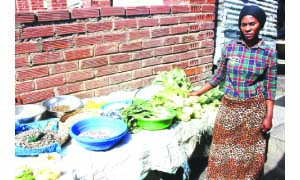By CHRSITINE KUNDA –
“I AM incapable of engaging in any income-generating activity such as agriculture due to old age, but I can now afford three meals per day with the coming of social cash transfer now.”
These are the words of 83 -years-old Dickson Banda of Mambwe District in Eastern Province.
Mr Banda is one of the beneficiaries of Social Cash Transfer (SCT) scheme.
According to Mr Banda, SCT has enabled him have access to basic needs and services like health care and food.
“The money I am receiving is greatly helpful. It would have been very difficult for me to survive at my age without the said money,” he said.
Some elderly people suffer from isolation due to stigma while others are suspected of practising witchcraft.
Poverty is also highly pronounced among such people.
Social cash transfer interventions is providing a decent living for him as it is helping him have access to basic necessities.
“I want to thank Government for introducing the SCT Scheme. I do not know what I would have done without this initiative.
It has really helped me in taking care of my sick grandchild,” he said.
Lydia Kaunda, 39, a widow with four children is another beneficiary from Shikoswe Kafue District, says SCT Scheme has assisted her engage in buying and selling vegetables, a development which has greatly contributed to her household’s food security.
These are among the testimonies that have come to the fore of how SCT is transforming the lives of people, especially in rural areas.
Social protection is progressively taking centre stage as a critical tool in the drive to eradicating poverty.
It is worth noting that social protection has been outlined as one of the key instruments in attaining Sustainable Development Goals (SDG’s) and the African Union Agenda 2063.
As it is a necessity for social justice, equitable and inclusive economic development – a key role and task of a successful nation or states.
In an effort to stimulate and strengthen public dialogue on pertinent social protection related issues at different levels, Government has released K1.46 billion for social protection programmes.
According to Finance and National Planning Minister Situmbeko Musokotwane, K215 million is for drugs and medical supplies purchases while K169 million is for SCT programme with K40 million being for the Food and Security Pack Programme.
Moreover, K1 billion will be payments for pensioners under the Public and Service Pensions Fund (PSPF).
Dr Musokotwane said the releases that were financed by International Monetary Fund (IMF) Special Drawing Rights (SDR) to ensure sustainable protection of the poor and the vulnerable in the country.
“SCT had been scaled-up by increasing the number of beneficiaries to more than one million from less than 885,000 in August, 2021 and regarding the food pack programme the number of beneficiaries had been increased to 290, 000 households from less than 264,000 last year,” he said.
On health, K217 million has been released in line with the 2022 National Budget to ensure the availability of drugs and other medical supplies in health facilities.
Dr Musokotwane said other social protection interventions that would be scaled up this year include the Girls Education and Women’s Empowerment and Livelihood Programme, the Home-Grown School Feeding Programme, Public Welfare Assistance Scheme and Child Welfare Programme.
To ensure checks and balances, special accounting and reports on the utilisation of the proceeds would be undertaken.
He urged social protection and pension funds implementing agencies to deploy transparent payment systems to help alleviate the hardships endured by citizens, especially unpaid retirees, the poor and the vulnerable.
Private Sector Development Association (PSDA) chairperson Yusuf Dodia says SCT programmes has become an important tool of social protection.
Mr Dodia said SCT was an important means to reduce hunger at the same time facilitating household level investment in productive activities.
Social protection not only tackles income poverty but also provides effective support for broader developmental objectives, including better nutrition, health and education outcomes.
“Social protection can help promote empowerment and security by improving risk management, facilitating higher return investments by poor people which support human capital development,” he said.
Evidence has also shown that a well-designed and implemented social protection scheme is an investment rather than a cost.
Social protection not only tackles income poverty but also provides effective support for broader developmental objectives, including better nutrition, health and education outcomes.
This vital intervention can contribute to sustainable poverty reduction and economic growth at household and community levels.







